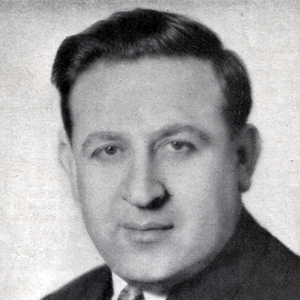Along with Billy Hill and Carson Robison, Bob Miller was among the pioneering professional songwriters who specialized in what was then called hillbilly music. Miller wrote some of the biggest hits of the 1930s and '40s and was also a prolific recording artist.
Born in 1895 in Ansonia, Connecticut, Bob and his four siblings were placed in an orphanage in Memphis, Tennessee, around 1904 after their parents died in a house fire. By age 10, Bob, who was a formally trained musician, began working professionally as a pianist. In his early twenties, he performed in the dance band that sailed on the Mississippi River aboard the showboat Idlewild. He also worked in the Memphis nightclub Dreamland and opened his own Beale Street Music Shop.
In 1928, Miller moved to New York, where he initially worked as a copyist and arranger
for Irving Berlin Music. He formed his own publishing company in 1933, and also
worked as an A&R man and record producer for the Columbia and Okeh labels.
Bob Miller has more than a thousand registered song copyrights, although many
of those are public-domain folk songs, Christmas carols and 19th-century
Stephen Foster chestnuts that he arranged, rather than wrote. But he did truly
compose a number of songs that became enormous country favorites.
His biggest early hit was the prison song "Twenty-One Years." During The Great Depression, this song was so popular and was sung by so many artists that
Miller wrote a number of follow-up songs to it, including "Twenty-One Years,
Part Two," "New Twenty-One Years," "Answer to Twenty-One Years," "Woman's
Answer to Twenty-One Years," "After Twenty-One Years," "The End of Twenty-One
Years" and "The Last of the Twenty-One Year Prisoner."
Similarly, "Seven Years with the Wrong Woman" was so omnipresent in Depression-era country music that it also spawned sequels. These included, inevitably, "Seven Years with the Wrong Man" and, humorously, "Seven Beers with the Wrong Woman" and "Seven Beers with the Wrong Man."
Perhaps his most enduring song from the Depression was the sentimental "Rocking Alone in an Old Rocking Chair," which is still sung by folk and country performers today.
Miller's activity in the 1940s was no less impressive. His million-selling "There's a Star Spangled Banner Waving Somewhere," recorded by Elton Britt, was one of the biggest hits of World War II. That song, too, spawned a sequel in 1960 when Dave McEnery combined Miller’s melody with new lyrics for "There's a Star Spangled Banner Waving Somewhere #2 - The Ballad of Francis Powers" in tribute to U-2 pilot Francis Gary Powers, whose plane was shot down over the Soviet Union. Miller’s "Chime Bells," also recorded by Elton Britt, became a yodeling standard.
Bob Miller wrote and recorded under a number of pseudonyms, including Shelby Darnell, Bob Kackley, Lawrence Wilson, Dinny Dimes and Trebor Rellim — which was
his name spelled backwards.
